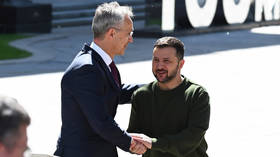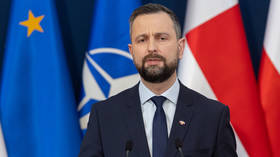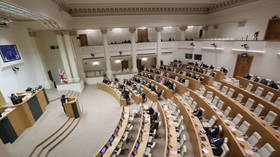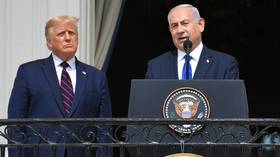Internet still subject to degree of monopoly – Communications minister
Russia needs to reform its governing procedures to catch up with fast-changing Internet technology and set up practical regulatory mechanisms, announced Russia’s Communications Minister, Igor Shchegolev.
Russia Today: Mr. Shchegolev, thanks for your time. The Internet is a global resource that embraces government, NGOs and the private sector. How come the administration of such a global structure is still in the hands of one private American company, ICANN, which co-operates closely with the US government, particularly the Department of Defense? It almost seems as if the Pentagon has patented the Internet’s management.
Igor Shchegolev: It mainly co-operates with the Department of Commerce; but the fact is that a certain monopoly is present in the world. This technology was invented to meet the interests of the US but then it expanded around the world. It’s been developing very rapidly, truly embracing all levels of our life. People make money on the Internet, and for the Internet. Even government systems now use these technologies. Nonetheless, the corporation has still been deciding everything. It is aware of changes taking place worldwide; and it makes certain concessions to the international community. It has good relations with Russia in this area, which is proved by the fact that our country was the first to get the right to create a national domain of the top level, dot RF. Within the present framework of co-operation, we can hardly complain about the Americans. We have a very good dialogue – we hear each other.
But some threats are arising for the Internet and Internet technologies. These threats can only be responded to internationally. This technology, the worldwide web does embrace the entire world; therefore, governments and even more so corporations simply cannot resolve internet-related problems. Therefore, Russia among a number of other countries is proposing the development of international mechanisms that would help fight the problems that even the Americans are concerned about.
RT: Our American colleagues, the current administration in particular, have been telling us that we should be working together against these threats, opening our borders, taking part in international forums, and so on. So how does the U.S. explain its own refusal to expand international participation in the Internet’s administration?
IS: Their key argument is that this is a very dynamic resource; therefore any attempt to bureaucratize this technology within an international structure would slow down the Internet’s development, and hinder efficient response to new technologies arising at least every 6 months, if not every month. Moreover, they reason that so far, this resource has been developing successfully without international involvement. They’re willing to co-operate bilaterally, at the non-governmental level, to tackle specific issues that arise. But they contradict their own position. One of the main concerns that the U.S. government has in telecommunications and CT is the threat to what they call cyber security. How can one fight such threats, unless they find a mechanism to enforce resolutions? In a corporation, as long as things keep developing according to commercial law, we won’t be able to fight technological risks, or extremism, terrorism and other things that the international community believes are unacceptable on the Internet. A commercial corporation, in spite of all the U.S. power, will not be able to cope with these problems, even at a bilateral level. Therefore Russia believes that we need an international institution that would respond to such issues. And we believe that the International Telecommunication Union would be the best institution for the job.
RT: This International Telecommunication Union that includes 192 countries intends to take over the Internet’s administration, and by doing so to end the American monopoly here. What are the benefits of devolving power from one state to a group of states?
IS: We aren’t saying that the ITU should take up all areas of the Internet’s development. We believe that some aspects should be regulated internationally. This organization was formed in 1865 when the UN was non-existent. It was founded by 20 countries including Russia. Consequently, it became one of the UN’s special-purpose organizations. It does bring together practically all countries in the world; and communications exist in all countries as well. Some technological communications-related issues arising between one state and another; or between a state and a group of states, are perfectly regulated by this organization. I’ll go so far as to say that this is one of the most efficient special-purpose organizations, if not the most efficient, that has an excellent reputation and great experts and well-established mechanisms, and that knows how to respond to all problems. Its response is probably not as efficient as modern technology requires; nonetheless, communications work in all countries; operators maintain their relations in spite of different levels of development and types of technology. One way or another, they manage to find compromises and technical and technological solutions that enable communications to function properly.
RT: How will it happen from the practical point of view? If the ITU gets this power, how will its almost 200 countries agree in spite of their different opinions?
IS: That’s something we mentioned in the beginning: it takes a consensus to oppose certain issues. Our American colleagues are proposing bilateral agreements on fighting these problems and are thus countering the various negative issues. Now if we ask mathematicians to calculate how many bilateral agreements between the 192 ITU member states it would take, we’d realize this number is almost endless, not even mentioning the time it would take to sign all those documents. Provided that all states agree on a small number of issues that should definitely be regulated internationally, we could spend 12 or 18 months developing mechanisms of tackling those issues, and then start fighting them by means of the ITU.
RT: As for Russia, what concrete proposals has it made?
IS: We suggest precisely this model. We say that it’s necessary to define a set of issues falling under ITU regulation, to set up mechanisms of regulation and try to apply them in practical life. For that, we also support a reform of documents of the International Telecommunication Union. Under the ITU charter, all underlying principles should first be approved at plenipotentiary conferences and later submitted for ratification to national governments. Naturally, this bureaucratic process can go around in circles infinitely. This is how things stand now. We suggest revising the charter so that it reflects only cornerstone issues. We want this document to be untouchable like national constitutions, and be subject to occasional change only, while the current issues could be solved without interference from national parliaments and without creating an excessively difficult procedure. That would have been our response to the concerns of our American partners – that the mechanisms we are suggesting will get stuck in red-tape.
RT: What about fighting cyber crime? How could the shifting of ITU powers help solve this problem?
IS: That would only contribute to fighting cyber crime. For example, we agree that child pornography is an absolute evil, inadmissible in any form. We would have signed an international treaty within the ITU that would oblige all signatories to agree on mechanisms of notification and technical measures allowing for the removal of this kind of information from the Internet. This mechanism would have started working following agreement and approval by all states. At the moment, some countries classify child pornography as a crime, and stipulate prosecution against those who distribute it on the Internet. But as you know, a pornographic website can easily be registered in countries that don’t consider this kind of information to be an offence and spread child pornography on the worldwide web. So until we define a range of joint problems that we are ready to fight together and mechanisms to do it, our efforts are not going to be effective.
RT: The political issues related to the Internet’s international management are still being studied. But there’s no doubt that there are some principles that are supported by most states. What are the differences among the main participants? In what do they agree?
IS: So far, we haven’t got down to any concrete discussion. This conference has become a milestone event. It adopted a resolution confirming the ITU’s application for international management of the Internet. Participating countries have confirmed their intention to assume certain powers and responsibilities in order to solve a whole number of issues. Now, we’ll have to agree on ways of implementing this application. To be frank, the Americans have a monopoly over the Internet, and it’s only natural that they should wish to take advantage of this situation, to set certain standards and ensure the participation of primarily U.S. IT companies in advancing those technological standards, technologies and products. It’s clear that the Americans are in no rush to share their influence on the Internet. But since they are also confronting certain threats and understand that too many resources are now linked to the Internet, they know that if no one handles these threats properly, this technology will become more and more vulnerable. And here Russia and the United States have a mutual understanding. I think that they can continue this dialogue and as the first step could start looking for small points of convergence and gradually expand this sphere of co-operation as new mechanisms start proving their efficiency.
RT: Mr. Schegolev, could this process of transition of power on the Internet be endless, or have preliminary dates been set?
IS: In the early 2000s a summit was held in Tunisia on the development of an information society. Responsibility was placed on the International Telecommunication Union (ITU) which had organized the conference. In 2010, the ITU will have to report on how it has implemented the decisions of the Tunisia summit on the development of an information society. This is exactly the cycle that exists within the framework of the International Telecommunication Union. Plenipotentiary conferences like the one held this year convene every four years. So there’s plenty of time before the next conference to work out new mechanisms, think how to carry out decisions made this year, and fill new proposals with concrete content.
RT: What are the potential difficulties of changing the model of running the Internet?
IS: The potential difficulty consists in the fact that the Internet is a fast-changing technology. And constantly trying to gain in something is not the best solution even if an international regulatory body is set up, but there’s little we can do about that because this is a condition dictated by the high speed of development of modern technologies. I see the main problem in the ability to react promptly to new technologies, new notions, new terms and new legal relations. That is why we are talking about the need to reform the governing procedures in the International Telecommunication Union and to make it more flexible and dynamic.
RT: Mr. Shchegolev, thank you very much for this interview.
IS: Thank you very much.













